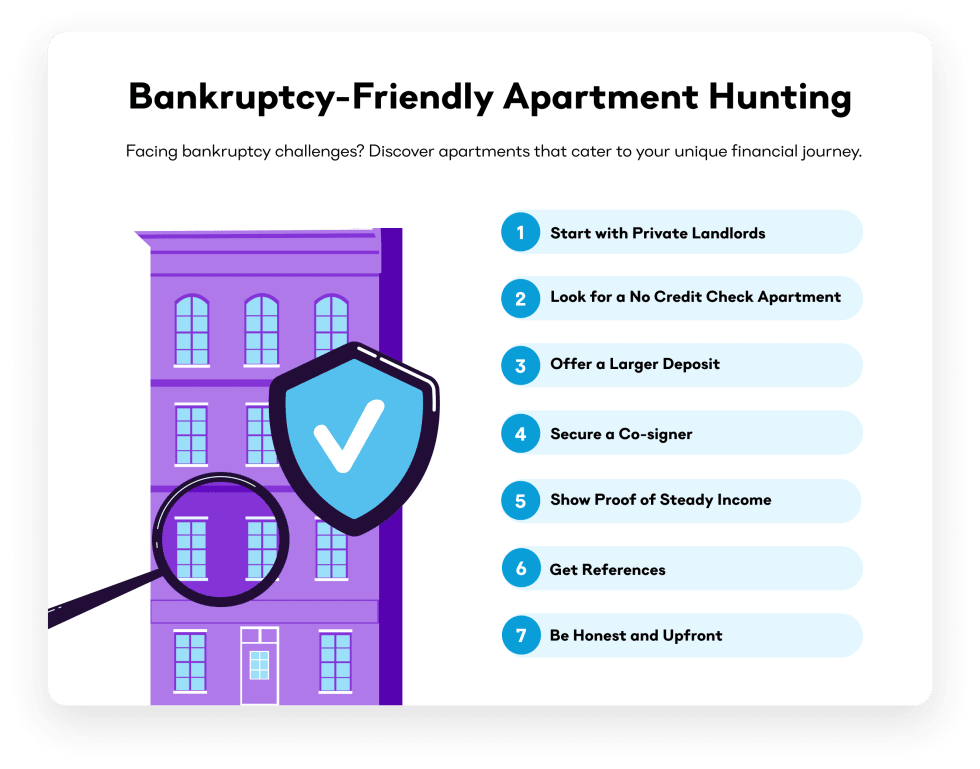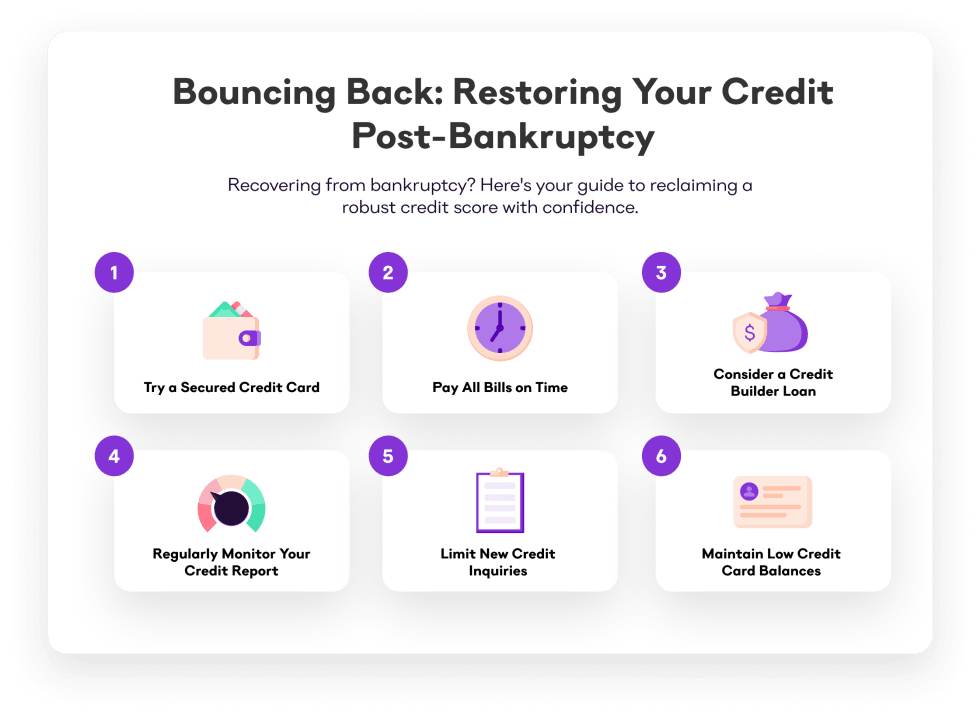Apartments that Accept Bankruptcies: How to Find Them

Navigating the world of renting can often feel overwhelming when you've faced financial challenges in the past. One of the biggest concerns for many is the haunting shadow of a bankruptcy on their record, which can become a major stumbling block in securing a rental. At first glance, it might seem overwhelming to think about looking for apartments that accept bankruptcies.
However, with the right strategies and a bit of persistence, you can locate rentals that are more accommodating of your financial history. In this article, we'll dive deep into the ways you can improve your chances of finding an apartment that accepts applicants with bankruptcies.
Want to hear more from a financial expert about why renting an apartment after bankruptcy is a good idea for many individuals? Check out this great video from ExpertVilliage Leaf Group:
Apartments That Accept Bankruptcies
Do Bankruptcies Affect Getting an Apartment?
Yes and no. It's up to landlords to decide how to interpret your credit history when evaluating a rental application. In some cases, apartments will not rent to someone who has had a bankruptcy in the last two years. Others may decide not to rent to someone who still has a bankruptcy in their credit history at all. These can last between 7 and 10 years.
However, it's possible to find landlords that will rent to someone with a bankruptcy, particularly if you can show your ability to pay rent in other ways or make arrangements to provide some kind of finacial assurance to your landlord. This guide is meant to help you do just that.

How Does Bankruptcy Affect Your Ability to Rent an Apartment?
When you declare bankruptcy, it's typically a move made out of necessity, aiming to give yourself a fresh start financially. While it might provide relief from debts, it does leave a mark on your credit history. Landlords and rental agencies commonly check potential tenants' credit as part of their screening process.
A bankruptcy can be a red flag because it might indicate a potential risk that the tenant could have trouble paying rent consistently. However, it's essential to understand that not all landlords view bankruptcies the same way. While some may be wary, others might be more understanding, especially if you can provide context and show evidence of financial responsibility since the bankruptcy.
How to Find Apartments That Accept Bankruptcies
Most landlords will not advertise that they accept applications from renters with a bankruptcy history. However, such landlords definitely exist, and there are several ways to find them.
1. Prepare an Explanation
No matter who you talk to when applying for an apartment, you'll need to be honest about your history, and you'll need to be able to account for your ability to pay rent on time. Therefore, before applying for any apartment, it's crucial to have a well-prepared explanation for your bankruptcy. This explanation should not only acknowledge the bankruptcy but also demonstrate your financial stability and commitment to paying rent. Here are some tips:
- Be honest and concise: Clearly state the circumstances that led to the bankruptcy.
- Highlight your recovery: Emphasize the steps you've taken to improve your financial situation since the bankruptcy. This could include debt repayment plans, increased income, or an improvement in your credit score.
- Anticipate concerns: Consider what potential concerns and landlord might have about your history and provide reassuring answers. For example, you might offer to provide a guarantor or pay several months' rent upfront.
- Showcase your reliability: Demonstrate your ability to be a responsible tenant. This might involve providing references from previous landlords, employers, or friends who can vouch for your character and reliability.
By preparing a thoughtful and persuasive explanation, you will feel more confident when applying and also increase your chances of securing a rental despite your bankruptcy history.
2. Start with Private Landlords
Unlike large property management companies that often have strict, set-in-stone criteria, private landlords are usually more flexible. Private landlords can set their own rules for accepting applications, and they also may be more open to negotiations because they do not have the budget or time to solicit as many applications as apartment companies. The key is to inquire about their application process and then be honest and up front about your history.
Engaging in a one-on-one conversation can allow you to explain your situation and potentially negotiate terms. In some cases, you may be able to find apartments that don’t perform credit checks at all. Check out our guide to no credit check apartments.
3. Offer a Larger Deposit
Demonstrating your commitment to a potential landlord can sometimes tip the balance in your favor. If you're financially able to do so, consider offering a larger security deposit as a sign of good faith.
4. Secure a Co-signer
If you have a trusted individual with better credit, they might be willing to co-sign your rental application. This provides an added layer of security for the landlord.
5. Show Proof of Steady Income
Even if your past credit history is shaky, current evidence of a stable income can be a positive sign. Providing recent pay stubs or a letter from your employer can assure landlords of your ability to cover rent.
6. Get References
If you've rented before and maintained a good relationship with past landlords, ask them for references. A positive recommendation can go a long way in negating the impact of a bankruptcy.
7. Be Honest and Upfront
Don't try to hide your bankruptcy. Instead, address it head-on in your application or initial conversations. Being honest about your past and proactive in sharing the steps you've taken since can leave a positive impression.
8. Optional: Look Just Outside of Town
If you have a reliable vehicle, and you don't mind driving a bit, you might have more luck if you look at the outskirts of the town you want to move to. You're more likely to find private landlords and also to face less competition with other renters, which will make your application more attractive, particularly if you can prove steady income.
Why Should You Look for an Apartment That Accepts Bankruptcies?
Being up front in your search and honest about your credit history by seeking out apartments that accept bankruptcies can be more than just a necessity. In fact, disclosing your financial history and ultimately renting successfully can provide provide multiple benefits for people who are trying to recover from a bankruptcy:
- Less Stress During Application: Apartments that are understanding of bankruptcies often have a more compassionate and realistic view of financial challenges. This means a smoother, less stressful application process without the constant fear of rejection due to your financial past.
- Building Positive Rental History: As financial expert Patrick Malone explains in the video at the top of the page, renting after a bankruptcy can actually be a good way to rebuild your credit. Securing a rental after bankruptcy gives you an opportunity to build a positive rental history and can impact your credit positively as well. Consistently paying your rent on time and maintaining a good relationship with the landlord can be a stepping stone towards better housing opportunities in the future.
- Fostering Understanding Relationships: Landlords or management companies that accept renters with bankruptcies might be more understanding in other areas as well, such as when unexpected financial hardships arise. This can create a more supportive landlord-tenant relationship.
- Opportunity for Financial Recovery: Living in a stable environment is crucial for financial recovery. By renting from an understanding landlord, you can focus on rebuilding your financial health without the added pressure of housing instability.

How Bankruptcy Affects Your Credit Score
The exact impact varies based on the credit profile, but it's not uncommon for scores to plummet by 200 points or more. This decline is because credit scores are designed to predict the risk of future non-payment, and a bankruptcy signals a history of not meeting financial obligations.
How Long Does a Bankruptcy Stay on Your Credit Report?
The duration a bankruptcy stays on your credit report largely depends on the type of bankruptcy you've filed:
- Chapter 7 Bankruptcy: This is the most common type and involves the liquidation of assets to pay off debts. A Chapter 7 bankruptcy can remain on your credit report for up to 10 years from the filing date.
- Chapter 13 Bankruptcy: Here, debtors agree to a payment plan to repay some or all of their debts over time. A Chapter 13 bankruptcy will stay on your credit report for 7 years from the filing date.
It's essential to note that even though a bankruptcy may be listed on your report for several years, its impact on your credit score decreases over time, especially if you engage in positive credit behavior.
How to Rebuild Your Credit After Bankruptcy
Rebuilding credit post-bankruptcy can be challenging, but it's far from impossible. Here's how you can start:
- Try a Secured Credit Card: These cards require a cash deposit, which serves as your credit limit. They allow you to build credit when regular cards might be out of reach.
- Pay All Bills on Time: Punctual payment of bills, from credit cards to utilities, is paramount in rebuilding your credit.
- Consider a Credit Builder Loan: Some financial institutions offer loans specifically designed to help people rebuild their credit.
- Regularly Monitor Your Credit Report: Ensure there are no errors or discrepancies on your report. If there are, address them immediately.
- Limit New Credit Inquiries: Too many hard inquiries in a short time can lower your score. Only apply for credit when absolutely necessary.
- Maintain Low Credit Card Balances: Keeping your credit utilization rate low (i.e., not maxing out your credit cards) can positively influence your score.

What to Ask an Apartment That Accepts Bankruptcies
When you've identified apartments that are understanding of bankruptcies, it's vital to have a clear idea of their specific requirements and terms. Here are some crucial questions to ask during your apartment search:
- What is the required security deposit? It's common for some landlords to ask for a higher security deposit from renters with a bankruptcy record. Make sure to clarify the amount upfront, so you're financially prepared.
- Do I need a co-signer or guarantor? Even if an apartment accepts renters with bankruptcies, they might still require an additional layer of security in the form of a co-signer or guarantor. This individual would be responsible for the rent if you default.
- What is the application process like? Understand the steps involved in the application. This can include credit checks, rental history reviews, or personal interviews. Knowing the process can help you gather the necessary documents and information.
- What are the rental requirements? Beyond just the bankruptcy consideration, be clear about any other requirements the landlord might have. This can range from income thresholds and employment verification to reference checks. Being informed of these can help you position your application more favorably.
Find Your New Apartment Today
Ready to embark on your next rental journey? By answering a few simple questions, you'll be matched with apartments that fit your location, budget, and desired amenities. You can use our internal messaging system to reach out to prospective landlords and ask them your questions about the application process and how they review credit history.
Discover your perfect rental space without the hassle.
FAQs about Apartments that Accept Bankruptcies
What Is a Bankruptcy?
Bankruptcy is a legal process where individuals or businesses declare their inability to pay off outstanding debts. This process allows the debtor to eliminate or repay some or all of their debts under the protection of the federal bankruptcy court. Depending on the type of bankruptcy filed, this can involve liquidating assets or formulating a repayment plan.
What Is the Difference Between a Bankruptcy And a Foreclosure?
Bankruptcy and foreclosure are both financial procedures related to debt. Bankruptcy is a broader process aimed at discharging or reorganizing various types of debts. Foreclosure, on the other hand, is specifically related to mortgages. It is the legal process through which a lender reclaims a property when the borrower fails to make mortgage payments.
Do I Need to Wait Until My Bankruptcy Is Discharged to Start Looking For An Apartment?
While it might be easier to secure an apartment after your bankruptcy is discharged, you don't necessarily have to wait. Some landlords or property management companies may be willing to rent to you before the discharge, especially if you can provide evidence of a steady income and other positive financial behaviors. It's crucial, however, to be transparent about your situation during the application process.
What Should I Do if I Am Denied an Apartment Because of My Bankruptcy?
If you're denied an apartment due to bankruptcy, don't be disheartened. Start by asking the landlord or property manager for a reason in writing, as this can provide clarity and potentially help in future applications. Next, consider finding a co-signer or offering a larger deposit as an act of good faith. Continue your search, focusing on private landlords or specialized platforms that cater to individuals with financial challenges.
Is Bankruptcy Discrimination Illegal?
In the United States, it is not illegal for landlords to deny applicants housing based on their bankruptcy filing history. However, there are some important exceptions to this rule.
Federal Law
The Bankruptcy Code does not explicitly prohibit landlords from discriminating against applicants based on their bankruptcy filing history. However, the Fair Housing Act (FHA) does prohibit landlords from discriminating against applicants based on certain protected characteristics, such as race, color, religion, national origin, sex, familial status, and disability. In some cases, a landlord's decision to deny housing to an applicant based on their bankruptcy filing history could be considered a form of disparate impact discrimination under the FHA.
State and Local Laws
Some states and municipalities have their own laws that prohibit landlords from discriminating against applicants based on their bankruptcy filing history. For example, California's Fair Housing and Employment Act (FEHA) prohibits landlords from denying housing to applicants based on their bankruptcy filing history if the applicant can demonstrate that they are capable of paying rent and complying with the terms of the lease.
Share this Article




